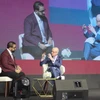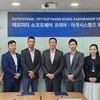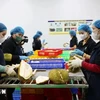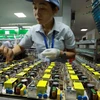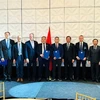Building and promoting brands is vital for Vietnamese businesses to integrate deeply and widely into the global economy, experts said.
The establishment of the ASEAN Economic Community (AEC) at the end of this year will offer both opportunities and challenges for small- and medium-sized enterprises, they added.
Pham Ngoc Hung, Vice Chairman of the Ho Chi Minh City Union of Business Associations, noted that other ASEAN member nations have thoroughly prepared laws, policies and strategies to support their businesses to make inroads into Vietnam.
Meanwhile, up to 60-70 percent of Vietnamese firms are unaware of integration issues, he cited, adding that only a few Vietnamese brands are competitive in both domestic and foreign playgrounds such as Ton Hoa Sen, Vissan and Saigon food.
Most businesses have yet to increase goods quality due to financial shortages and difficulties in accessing capital, he noted.
Chairwoman of the Association of Vietnam Retailers Dinh Thi My Loan said the operation of foreign retail firms in the local market is inevitable since Vietnam is expanding its market and joining a number of new generation free trade agreements.
The engagement of the overseas retail businesses, which make up 25-26 percent of the market, is considered important momentum to develop the retail industry in Vietnam, she said, naming popular brands at home such as Saigon Coop, Fivimart, Vinmart, Satra and Fahasah.
However, local manufacturing firms could face substantial pressure due to the flood of imported goods from ASEAN member countries with various designs and reasonable prices such as consumer products from Thailand, Indonesia, Malaysia and the Philippines.
Domestic businesses should reform their operations and management to improve competitiveness and strengthen their foothold in the market while increasing cooperation for mutual benefit, experts advised.
They called on the State to build technical barriers to protect domestic products and enhance market management to prevent counterfeit goods from entering the market.-VNA
The establishment of the ASEAN Economic Community (AEC) at the end of this year will offer both opportunities and challenges for small- and medium-sized enterprises, they added.
Pham Ngoc Hung, Vice Chairman of the Ho Chi Minh City Union of Business Associations, noted that other ASEAN member nations have thoroughly prepared laws, policies and strategies to support their businesses to make inroads into Vietnam.
Meanwhile, up to 60-70 percent of Vietnamese firms are unaware of integration issues, he cited, adding that only a few Vietnamese brands are competitive in both domestic and foreign playgrounds such as Ton Hoa Sen, Vissan and Saigon food.
Most businesses have yet to increase goods quality due to financial shortages and difficulties in accessing capital, he noted.
Chairwoman of the Association of Vietnam Retailers Dinh Thi My Loan said the operation of foreign retail firms in the local market is inevitable since Vietnam is expanding its market and joining a number of new generation free trade agreements.
The engagement of the overseas retail businesses, which make up 25-26 percent of the market, is considered important momentum to develop the retail industry in Vietnam, she said, naming popular brands at home such as Saigon Coop, Fivimart, Vinmart, Satra and Fahasah.
However, local manufacturing firms could face substantial pressure due to the flood of imported goods from ASEAN member countries with various designs and reasonable prices such as consumer products from Thailand, Indonesia, Malaysia and the Philippines.
Domestic businesses should reform their operations and management to improve competitiveness and strengthen their foothold in the market while increasing cooperation for mutual benefit, experts advised.
They called on the State to build technical barriers to protect domestic products and enhance market management to prevent counterfeit goods from entering the market.-VNA

